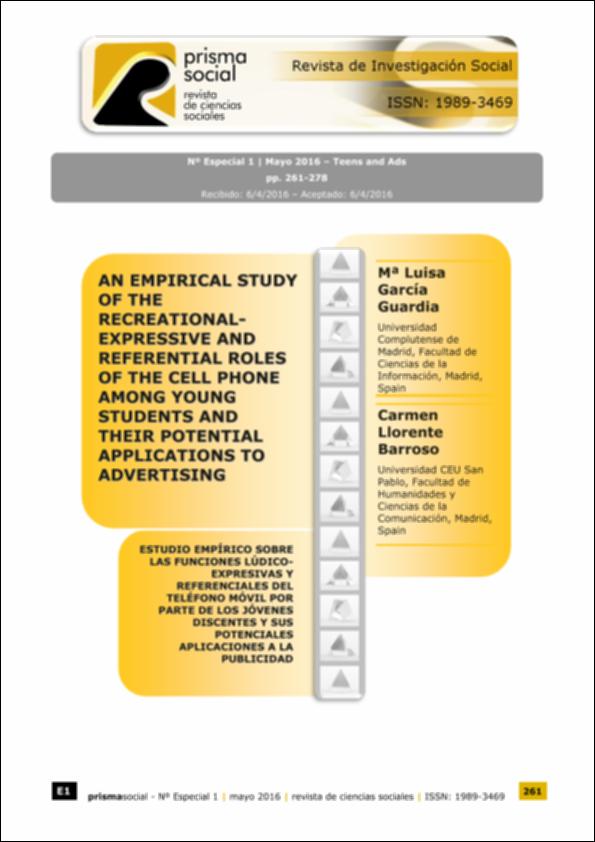Por favor, use este identificador para citar o enlazar este ítem:
http://hdl.handle.net/10637/8302An empirical study of the recreational-expressive and referential roles of the cell phone among young students and their potential applications to advertising.
| Título : | An empirical study of the recreational-expressive and referential roles of the cell phone among young students and their potential applications to advertising. |
| Autor : | LLorente Barroso, Carmen García Guardia, María Luisa |
| Materias: | Jóvenes.; Teléfono móvil.; Conducta social. |
| Resumen : | El móvil se ha convertido en un medio de adquisición de contenidos persuasivos, establecimiento de relaciones y acceso a la información, por lo que resulta de sumo interés analizar su uso por parte de los jóvenes durante su tiempo de aprendizaje. Al respecto, los objetivos de esta investigación son: Obtener datos porcentuales sobre la distracción que supone el uso del móvil para los discentes, definir sus hábitos respecto a aspectos lúdicos y responsabilidades de estudio en su vida personal y académica, e identificar las tendencias lúdico-expresivas y referenciales. Se ha determinado analizar el discurso español vertido en Twitter. Para ello, se ha utilizado una metodología cuantitativa y cualitativa, con una herramienta de extracción de patrones lingüísticos que permite obtener categorías de significado. La muestra era de 10.000 mensajes en español, procedentes de perfiles de jóvenes, con palabras clave tales como “móvil” y “estudiar” en todas sus posibles derivaciones. La recogida de datos se ha realizado entre el 30 de mayo y el 6 de junio de 2014, coincidiendo con la etapa de comienzo de exámenes. Finalmente, se ha discutido sobre las potenciales aplicaciones de la investigación al campo específico de la publicidad como una posible solución a las necesidades actuales de las marcas, que deben buscar formatos participativos considerando los aspectos lúdicos de los discentes. The cell phone has become a means of finding persuasive content, making friends and accessing information. For this reason it is of great interest in analyzing is use by young people during their formative years. Regarding this point, the objectives of the research are: to obtain percentage data on the distraction call phones cause among students; to define their habits re fun activities and their study responsibility in their personal and academic lives; and to identify leisure-expressive and referential trends. It was decided to analyze the Spanish discourse found on Twitter. To do so, a quantitative and qualitative methodology was used, with a linguistic pattern extraction tool which allows us to obtain categories of meaning. The sample was 10,000 tweets in Spanish, with key words such as “cell” and “study” and all possible derivatives. The data were gathered between 30 May and the 6 June 2014, which coincides with the start of the exam period in Spain. Finally, the potential applications of the research to the specific field of publicity and advertising is discussed as a possible solution to the current needs of the brands, which have to find participative formats taking into account the students’leisure trends. |
| Descripción : | En: Prisma Social : revista de ciencias sociales. eISSN. 1989-3469 n. 1 Especial, 2016, pp. 261-278 |
| URI : | http://hdl.handle.net/10637/8302 |
| Derechos: | http://creativecommons.org/licenses/by-nc-nd/4.0/deed.es |
| Fecha de publicación : | 1-feb-2016 |
| Centro : | Universidad San Pablo-CEU |
| Aparece en las colecciones: | Facultad de Humanidades y CC de la Comunicación |
Los ítems de DSpace están protegidos por copyright, con todos los derechos reservados, a menos que se indique lo contrario.


